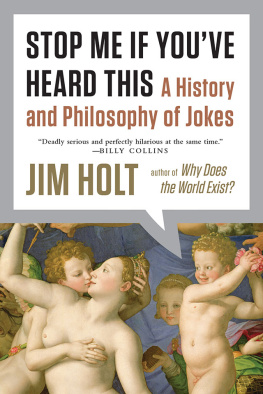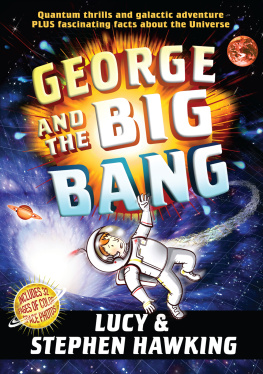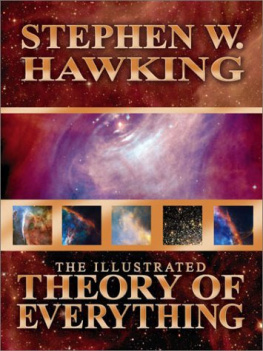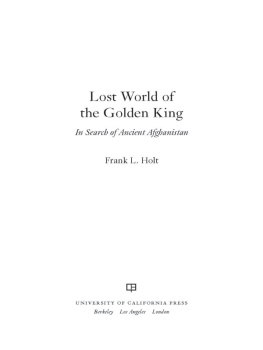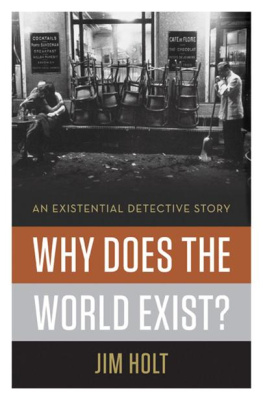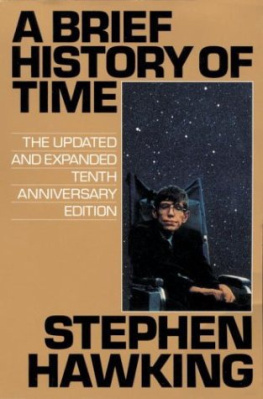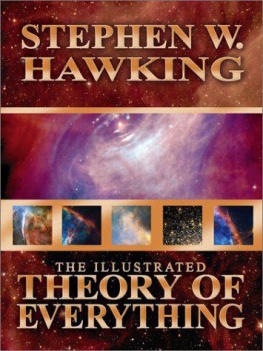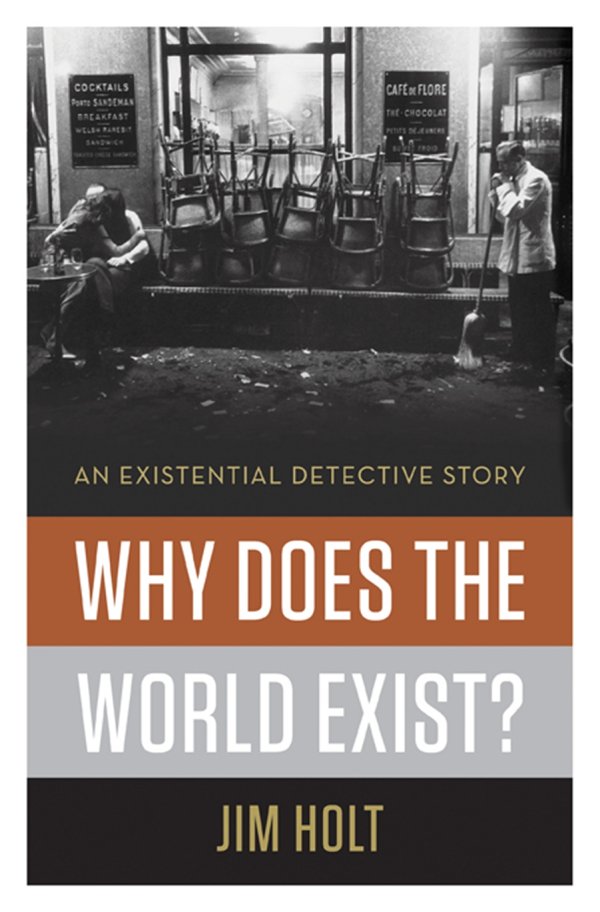
ALSO BY JIM HOLT
Stop Me If Youve Heard This: A History and Philosophy of Jokes
WHY DOES
THE WORLD
EXIST?
An Existential Detective Story
JIM HOLT

LIVERIGHT PUBLISHING CORPORATION
A Division of W. W. Norton & Company
New York London
Contents
PROLOGUE: A Quick Proof That There Must Be Something
Rather Than Nothing, for Modern People Who Lead
Busy Lives
INTERLUDE : Could Our World Have Been Created
by a Hacker?
Prologue
A Quick Proof That There Must Be Something Rather Than Nothing, for Modern People Who Lead Busy Lives
Suppose there were nothing. Then there would be no laws; for laws, after all, are something. If there were no laws, then everything would be permitted. If everything were permitted, then nothing would be forbidden. So if there were nothing, nothing would be forbidden. Thus nothing is self-forbidding.
Therefore, there must be something. QED.
CONFRONTING THE MYSTERY
And this grey spirit, yearning in desire
To follow knowledge like a sinking star
Beyond the utmost bound of human thought.
ALFRED, LOR D TENNYSON , Ulysses
I would earnestly warn you against trying to find out the reason for and explanation of everything.... To try and find out the reason for everything is very dangerous and leads to nothing but disappointment and dissatisfaction, unsettling your mind and in the end making you miserable.
QUEEN VICTORIA, in a letter to her granddaughter Princess Victoria of Hesse, 22 August 1883
... well who was the first person in the universe before there was anybody that made it all who ah that they dont know neither do I...
MOLLYS SOLILOQUY, in James Joyces Ulysses
I vividly remember when the mystery of existence first swam into my ken. It was in the early 1970s. I was a callow and would-be rebellious high-school student in rural Virginia. As callow and would-be rebellious high-school students sometimes do, I had begun to develop an interest in existentialism, a philosophy that seemed to hold out hope for resolving my adolescent insecurities, or at least elevating them to a grander plain. One day I went to the local college library and checked out some impressive-looking tomes: Sartres Being and Nothingness and Heideggers Introduction to Metaphysics . It was in the opening pages of the latter book, with its promising title, that I was first confronted by the question Why is there something rather than nothing at all? I can still recall being bowled over by its starkness, its purity, its sheer power. Here was the super-ultimate why question, the one that loomed behind all the others that mankind had ever asked. Where, I wondered, had it been all my (admittedly brief) intellectual life?
It has been said that the question Why is there something rather than nothing? is so profound that it would occur only to a metaphysician, yet so simple that it would occur only to a child. I was too young then to be a metaphysician. But why had I missed the question as a child? In retrospect, the answer was obvious. My natural metaphysical curiosity had been stifled by my religious upbringing. From my earliest childhood I had been toldby my mother and father, by the nuns who taught me in elementary school, by the Franciscan monks at the monastery over the hill from where we livedthat God created the world, and that He created it out of nothing at all. Thats why the world existed. Thats why I existed. As to why God himself existed, this was left a little vague. Unlike the finite world that He freely created, God was eternal. He was also all-powerful and possessed of every other perfection to an infinite degree. So perhaps He didnt need an explanation for his own existence. Being omnipotent, He might have bootstrapped Himself into existence. He was, to use the Latin phrase, causa sui .
This was the story that was imparted to me as a child. It is a story still believed by the vast majority of Americans. For these believers, there is no such thing as the mystery of existence. If you ask them why the universe exists, theyll say it exists because God made it. If you then ask them why God exists, the answer you get will depend on how theologically sophisticated they are. They might say that God is self-caused, that He is the ground of His own being, that His existence is contained in His very essence. Or they might tell you that people who ask such impious questions will burn in hell.
But suppose you ask nonbelievers the Big Bang.
What options do you have for resolving the mystery of existence once you let go of the God hypothesis? Well, you might expect that science will someday explain not only how the world is, but why is it. This, at least, is the hope of Dawkins, who looks to theoretical physics for an answer. yoctosecond of the universes existence will turn out, when it is better understood, to be a cosmological crane to stand alongside Darwins biological one, Dawkins has written.
Stephen Hawking, who is actually a practicing cosmologist, takes a different approach. Hawking came up with a theoretical model in which the universe, though finite in time, is completely self-contained, without beginning fire into the equations and makes a universe for them to describe? he plaintively asks. Why does the universe go through all the bother of existing?
The problem with the science option would seem to be this. The universe comprises everything that physically exists. A scientific explanation must involve some sort of physical cause. But any physical cause is by definition part of the universe to be explained. Thus any purely scientific explanation of the existence of the universe is doomed to be circular. Even if it starts from something very minimala cosmic egg, a tiny bit of quantum vacuum, a singularityit still starts with something , not nothing. Science may be able to trace how the current universe evolved from an earlier state of physical reality, even following the process back as far as the Big Bang. But ultimately science hits a wall. It cant account for the origin of the primal physical state out of nothing. That, at least, is what diehard defenders of the God hypothesis insist.
Historically, when science has seemed incapable of explaining some natural phenomenon, religious believers have been quick to invoke a Divine Artificer to fill the gaponly to be embarrassed when science finally succeeds in filling it after all. Newton, for example, thought that God was needed to make little adjustments from time to time in the orbits of the planets to keep them from colliding. But a century later, Laplace proved that physics was quite capable of accounting for the stability of the solar system. (When Napolon asked Laplace where God was in his celestial scheme, Laplace famously replied, Je n'avais pas besoin de cette hypothse .) More recently, religious believers have maintained that blind natural selection alone cannot explain the emergence of complex organisms, so God must be guiding the evolutionary processa contention decisively (and gleefully) refuted by Dawkins and other Darwinians.
Such God of the gaps arguments, when they concern the minutiae of biology or astrophysics, tend to blow up in the faces of the religious believers who deploy them. But those believers feel themselves to be on University astronomer (and devout Mennonite) Owen Gingerich agrees. In a lecture titled Gods Universe, delivered at Harvards Memorial Church in 2005, Gingerich pronounced the ultimate why question to be a teleological onenot for science to grapple with.
Faced with this line of argument, the atheist typically shrugs his shoulders and says the world just is. Perhaps it exists because its always existed. Or perhaps it popped into being with no cause at all. In either case, its existence is just a brute fact.
Next page



